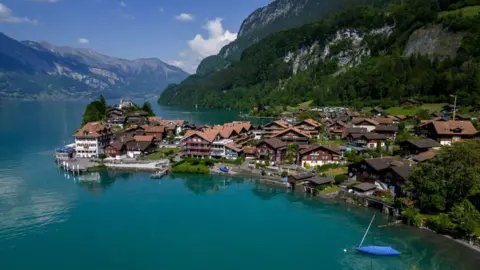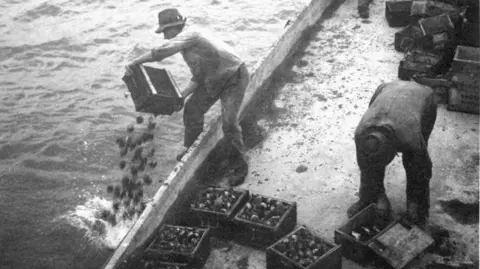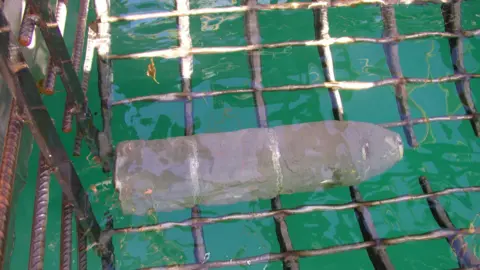
 AFP
AFPTourists enjoying the postcard views of Lake Lucerne, Lake Thun or Lake Neuchâtel might be surprised to discover what lies beneath those pristine Alpine waters.
For years, the Swiss army used the lakes as a dumping ground for old ammunition, believing it could be safely disposed of there.
In Lake Lucerne alone, there are an estimated 3,300 tons of ammunition, while in the waters of Neuchâtel there are 4,500 tons, used by the Swiss Air Force for bombing exercises until 2021.
Some munitions are found at depths between 150 and 220 metres, while others, in Lake Neuchâtel, are found only six or seven metres below the surface.
Now, the Swiss Department of Defense is offering 50,000 francs (£45,000) cash prize for the best idea to get it out.
The three best ideas for a safe, environmentally friendly solution to ammunition recovery will share the prize money, but the recovery operation is expected to cost billions.
Double jeopardy
The fact that so many shells have been dumped into Swiss lakes, including Brienz, has been known for decades, although recently people have raised questions about safety.
Retired Swiss geologist Marcos Buser, who advised the government on this issue, wrote a research paper ten years ago warning of the dangers of landfills.
The munitions pose two risks, he said. First, despite being underwater, there is still a risk of explosion, because in many cases “the military did not remove the fuses before unloading the munitions.”
Then there is water and soil contamination: there is a real possibility that the highly toxic TNT could pollute the lake water and sediments.
The Swiss government acknowledges that factors such as poor visibility, magnetic iron and the weight of individual munitions “represent major challenges for environmentally friendly munitions recovery.”
An assessment of possible recovery techniques conducted in 2005 demonstrated that all proposed solutions for the recovery of the munitions posed serious risks to the delicate ecosystems of the lakes.
History of problems

 vbs
vbsThis is not the first time that the Swiss army has been a bit careless with its ammunition.
The Alpine village of Mitholz suffered a massive explosion in 1947, when 3,000 tons of ammunition that the army had stored on the mountain overlooking the village exploded.
Nine people were killed and the village was destroyed. The explosion was heard as far away as 160 kilometers (100 miles) in Zurich.
Three years ago, the army revealed that the 3,500 tons of unexploded munitions still buried in the mountain were not at all safe and said they would be removed.
For the residents of Mitholz this meant having to leave their homes for a decade while clean-up operations were carried out.
There were also scandals over neutral Switzerland’s defense strategy during the Cold War, which involved mining its bridges and tunnels against an invasion. Some bridges had to be quickly cleared of mines because modern heavy vehicles risked triggering an explosion.
In 2001, 11 people died in the Gotthard Tunnel, one of Europe’s main north-south transport arteries, when a fire broke out following the collision between two trucks.
Large quantities of explosives, not involved in the fire, were still stored in a warehouse near the tunnel mouth, and after firefighters had managed to put out the fire, the army arrived with demining equipment at hand.
And this week the military revealed that reports of unexploded ordnance being found in the Swiss countryside by civilians increased by 12% last year (compared to 2022).
Even on glaciers now retreating due to the effects of climate change, melting ice is revealing live and exploded ammunition left over from high-altitude training decades ago.
It is a legacy of Switzerland’s defense strategy of “armed neutrality,” which involves maintaining a large militia army (all Swiss men are required to perform military service) that trains its troops almost exclusively within the densely populated country.

 vbs
vbsLong and expensive
The task of removing the munitions from Swiss lakes is expected to be long and complicated. But first, someone must come up with a workable plan for exactly how to dispose of them.
While some complain that the Army should have thought about it before dumping, geologists have advised the military for decades to consider the practice safe.
The hunt for solutions is on. Following a call from the Swiss Department of Defense, the public can submit their ideas until February next year, when they will be evaluated anonymously by a jury of experts.
The three winners will be announced next April.
The government said: “There are no immediate plans to implement the items submitted, but they could serve as a basis for further clarification or for initiating research projects.”
Mr Buser suggests turning to the UK, Norway or Denmark for advice. their experience in the management of war relics containing unexploded ordnance.
So will he offer any ideas? “No, I’m too old now… but if they need any advice I’ll be happy to give it to them.”





